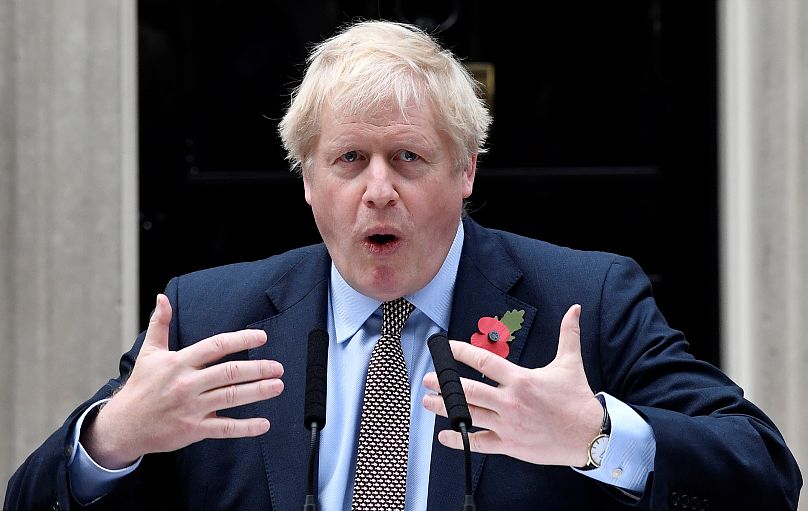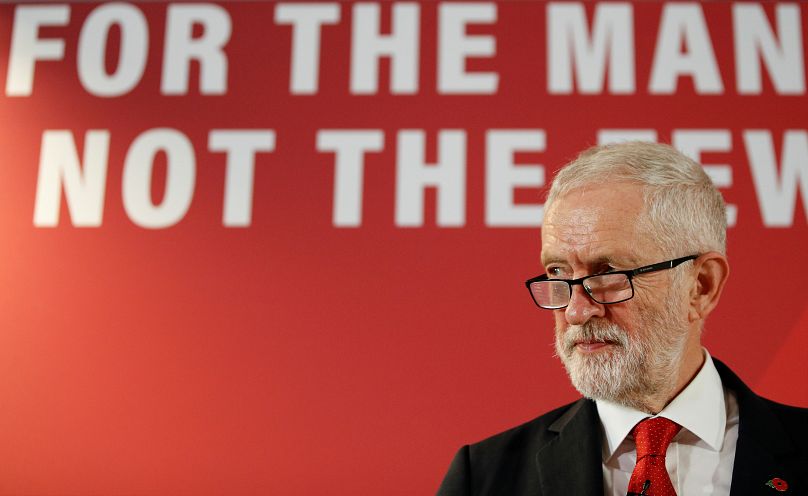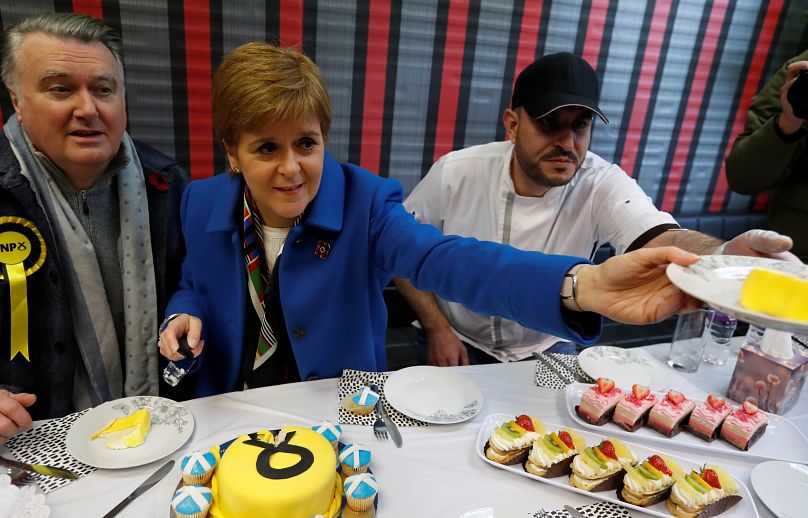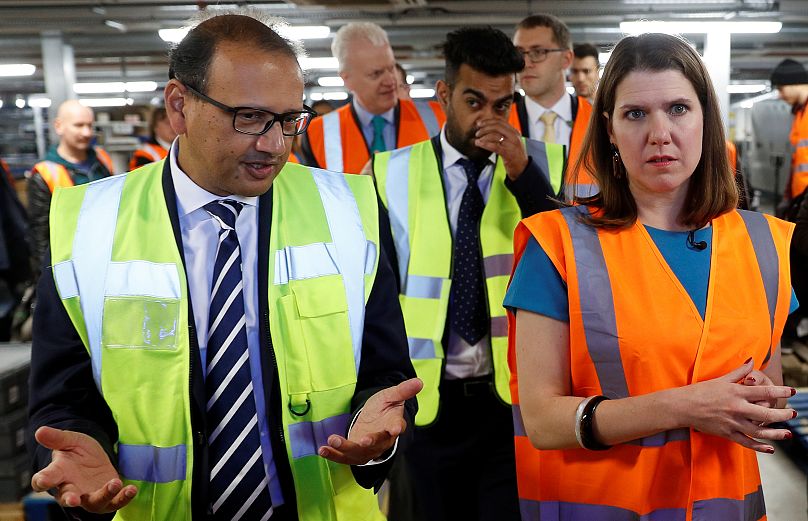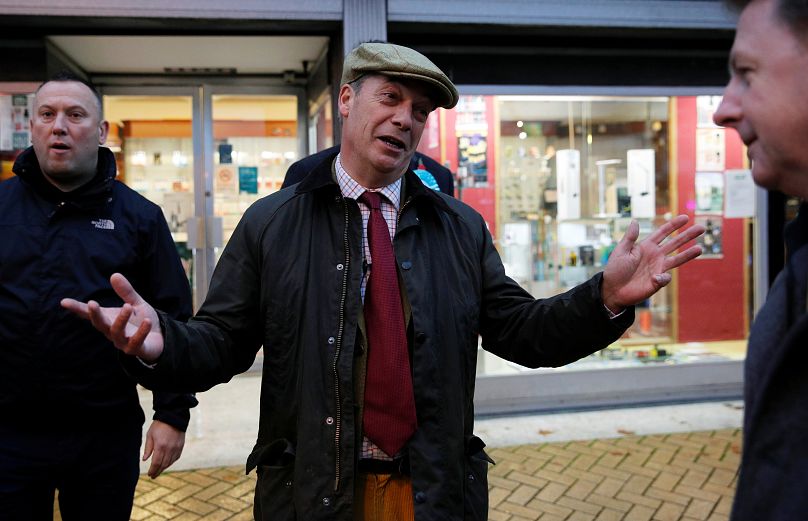Political parties are still in the process of writing their election manifestos - but here are the pledges made so far.
The early general election to be held on December 12 in the UK was called by Prime Minister Boris Johnson as a way to finally break the Brexit impasse in parliament.
Johnson is hoping he can win a clear majority and pass his law to take Britain out of the EU, followed by the legislative programme outlined in last month's Queen's Speech.
He is banking that his clear policy on Brexit — leaving, as soon as possible, and preferably with a deal — can win over both Conservative and Labour voters that voted Leave in the 2016 referendum.
But this is a general election, and Brexit is far from the only issue the parties will be focusing on as they try to win over voters.
In the absence of formal manifestos from the parties as yet, Euronews outlines the main pledges and promises outlined by each party so far.
Conservatives
Running on the slogan “Back Boris. Get Brexit Done”, the Conservatives want to make the election a referendum on Boris Johnson’s “great new deal”.
Johnson had initially promised to take Britain out of the EU with or without a deal on October 31, but was compelled by parliament to ask for an extension to the deadline.
He managed to get approval from both the EU and parliament for his deal, but not for his intentions to force the deal through before the October 31 deadline. As a result, he shelved the deal and finally got backing for a general election.
Other than Brexit, Johnson has pledged to recruit 20,000 more police officers in the UK as part of a popular focus on law and order.
It has been noted, however, that police numbers have fallen by more than this number since the Conservatives first came into power in 2010.
The Conservatives are also pledging a £14 billion (€16.2bn) boost to schools, as well as an extra £33.9 billion (€39.3bn) for the NHS budget by 2023-24.
In his speech outside Downing Street, Johnson played heavily on fears of what a left-wing Jeremy Corbyn government would do to Britain, appealing to moderates as well as Tory voters.
Labour
Labour has caught a lot of flak for its position on Brexit, which has been at best pragmatic and at worst confused in the three years since the referendum.
After much to-ing and fro-ing over whether Labour would back a second referendum, the party has come out and said it will immediately legislate for a "final say vote" if it is elected on December 12.
It has committed to negotiating 'a sensible deal' within three months of taking power, and putting that deal to a public vote within six, with the option to either take that deal or remain in the EU.
Other policies - announced at the 2019 Labour Party Conference - that have grabbed headlines include a plan to scrap Ofsted, the UK's schools regulator, and ban private schools.
Many of the links on the Labour party's website as of November 6 were incomplete, inviting members of the public to 'help write Labour's 2019 manifesto' — but in a speech in Telford, leader Jeremy Corbyn outlined the general strategy.
"This election is a once-in-a-generation chance to transform our country and tear down the barriers that are holding people back," he said.
"A chance to rebuild our NHS, schools and police by taxing those at the top to properly fund services for everyone.
"And a chance to tackle the climate emergency, with a Green Industrial Revolution at the very heart of our transformation of Britain."
Scottish National Party
Since almost wiping out Labour, the Conservatives and the Liberal Democrats north of the border back in 2015, the Scottish National Party saw its number of seats in the House of Commons drop from 56 to 35 after the 2017 election. In 2019, it is planning a clean sweep across Scotland.
Chief among its pledges is a second referendum for independence, five years since the country voted by 55.3% to remain part of the UK. Its leader, Nicola Sturgeon, says that Scots should have the right to choose whether they want to be dragged from Europe if and when Britain leaves the EU.
"A vote for the SNP is a vote to escape Brexit and the Westminster chaos. And a vote for the SNP will demand Scotland's right to choose it's own future," the party's website promises.
But while in the UK the SNP is associated with independence alone, it has been its focus on local issues that has won it support in Scotland.
Alongside pledges on the NHS and reforming the much-hated Universal Credit system, the SNP highlights the closures of bank branches and poor internet connectivity.
Liberal Democrats
Unlike Labour, the Liberal Democrats have come out firmly for Remain, and new leader Jo Swinson has promised to stop Brexit and invest the billions that Britain will save back into public services.
She has also outlined the Liberal Democrats pitch on environmentalism, hoping that a renewed focus on climate change will win over young voters. The party has committed to generating 80% of energy from renewables by 2030 and insulating all low-income homes by 2025.
Other policies include recruiting 20,000 more teachers as part of a £10 billion (€11.6bn) investment in schools, and providing free childcare for nine months. Lastly, the party has promised to focus on mental health, treating it with the same sense of urgency as physical health.
The Liberal Democrats are a relatively small party, with just 19 MPs, and Swinson is regularly asked if she would prop up a Labour government if it is a close election. She insists that the Liberal Democrats would not, and that her party can win enough seats for her to become prime minister.
Brexit Party
Nigel Farage launched the Brexit Party's campaign last week, followed by an audacious plan to field no less than 600 MPs across the UK.
Farage argues that Johnson's deal is "not a real Brexit" and has urged the prime minister to drop it and take the UK out of the EU without a deal. He says this "clean break Brexit" would mean that Britain did not have to pay the EU's sizeable "divorce bill" and could sign free trade agreements with other nations.
He has promised not to run against pro-Leave Conservatives if Johnson accepts his plan, but the prime minister has consistently rejected his offer of an electoral alliance.
Aside from Brexit, the Brexit Party has committed to opposing the HS2 high-speed rail project and supporting the fisheries industry, as well as free wifi on public transport and slashing business rates.
Farage has previously called for the UK to adopt proportional representation, known as PR, which provides for parties to gain seats in parliament according to the number of votes they receive. Britain’s first-past-the-post (FPTP) system favours incumbent parties, meaning that while UKIP, for example, won 3.8 million votes in 2015 - they attained just one parliamentary seat.
Green Party
With just one MP, Caroline Lucas, the Green Party are one of the smaller players in next month's election. Central to its programme is environmental issues, local government and a commitment to a second referendum on Brexit, which it claims to have opposed "from the start".
In her opening letter on the Green Party's programme, Lucas writes: "We are living through climate breakdown. We have an economy that prizes pointless jobs and condemns people to a lifetime of drudgery.
"We have an electoral system that excludes everyone outside of swing seats of a meaningful vote. Britain needs a party that makes the desirable feasible – that says what needs to be said, not what is deemed acceptable by the powers-that-be."
Like the Liberal Democrats and the Brexit Party (although not all of its members agree), the Greens back electoral reform that would allow smaller parties to have a bigger presence in parliament.
Plaid Cymru
The Party of Wales, Plaid Cymru, has marketed itself this month as "Wales' lead party of Remain", but unlike Scotland, Wales voted Leave in the 2016 referendum and Johnson's Conservatives are hoping to woo Brexit voters over to their side.
Plaid Cymru currently has four MPs, but at a campaign launch its leader, Adam Price, suggested that the nationalist party could push for Welsh independence if it increases its presence on December 12.












